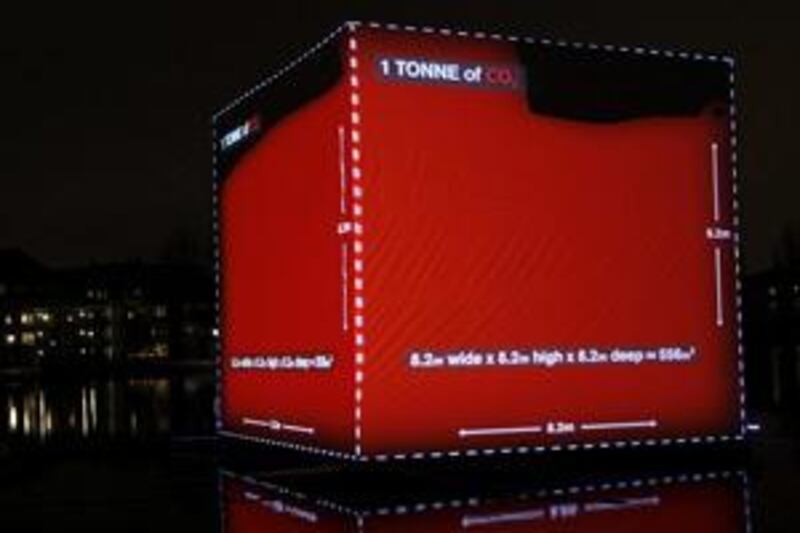If the UN's 15th annual climate change conference in Copenhagen achieves nothing else, it will serve as a reprieve from the usual do-as-I-say-not-as-I-do hypocrisy to which environmentalists are prone. If anyone is well positioned to lead by example, it is the Danes, though the Swedes and Norwegians are equally qualified. After all, Denmark is among the few (three?) countries in the world to have already done their maths homework.
In taking measures to "green" the conference to the extreme (at least in the view of anyone not from Denmark), organisers of COP15 simply want to prove that sustainability is, indeed, possible. The extreme greening at this conference may be loved or hated by attendees, laughed at or found inspirational, but an impression will undoubtedly be made. "We have tried to make the conference as green as possible under the given conditions," Jan-Christoph Napierski, the head of sustainability for COP15, told The Toronto Star earlier this week.
Upon arrival in Denmark, delegates and world leaders were met not with limousines and chauffeurs but with bicycles and free bus passes. How their luggage got to the hotels is another matter, but the decidedly un-luxurious transit options are sending the message that dealing with climate change seriously involves compromise and sacrifice. Organisers have a small fleet of limousines for the delegates who truly cannot cope with alternative transportation, but shhhhh, this fact has not been be trumpeted and the vehicles have been kept out of view. At the same time, the influx of 15,000-16,000 people into Copenhagen means that bike traffic is probably swelling enormously. Please wear a helmet and don't forget to look both ways before crossing.
The delegates' whistles have been wetted with locally sourced tap water rather than its expensive bottled equivalent, though Napierski admitted that anyone who brings their own bottled water will not be tarred and feathered. (Just quietly judged, perhaps.) The venue, the downtown Bella Center, is one big energy-saving machine. Two years ago, a ?2.5 million (Dh14m) investment was made in the building's energy system to reduce its carbon emissions by 20 per cent over a 24-month period. That's 1,500 tonnes of CO2 a year. Wind power generates electricity for the building's lighting and the floors are covered in biodegradable carpeting.
Usually gift-giving comes into play in big international conferences. Not this one. The real rewards, it is hoped, will be consensus, agreement and ultimately the saving of the Earth. Money saved by not giving out gift bags will be used to send 11 students to local universities to study climate change. Attendees are being actively discouraged from using paper (trees, people, save the trees). What stationery offerings there will be are eco-certified and 100 per cent chlorine-free, naturally.
Pens distributed at the conference are no ordinary writing utensils. Plastic bottles in their previous lives, they are made from almost entirely recycled material. About 2,000 laptops will be supplied by the Bella Center - not that they don't trust your laptop, it's just that their versions use much less energy than a conventional computer, and energy efficiency is what Denmark is all about. This tiny Nordic country supplies all its own energy and, at 29.6 per cent, has one of the highest proportions of renewable energy sources in the world.
The one thing even the Danes can't fix, however, is the fact that all the delegates have flown in from around the world, which emitted tonnes of carbon emissions into the atmosphere. To offset the emissions, conference organisers pledged to replace 20 brick factories in Bangladesh with new, energy-efficient buildings. But some people are never satisfied. And if there's one place to find the permanently disgruntled, it's in the comments posted under news stories on websites.
"Have none of these environmentalists heard of video conferencing?" laments one angry reader on The Toronto Star's website. "It would eliminate the massive carbon footprint that comes from flying if everybody just stayed home and logged into the conference." Patrick Michaels, a senior fellow of environmental studies at the Cato Institute, said the conference will have a sizeable carbon footprint. "Where is video conferencing when we need it?" he wondered in an interview with Fox News. "An equally important question is what will be accomplished here?"
Reduction of carbon emissions may be among the goals of this conference, but its achievement isn't guaranteed. What is guaranteed, however, is the generation of lots of hot air.










